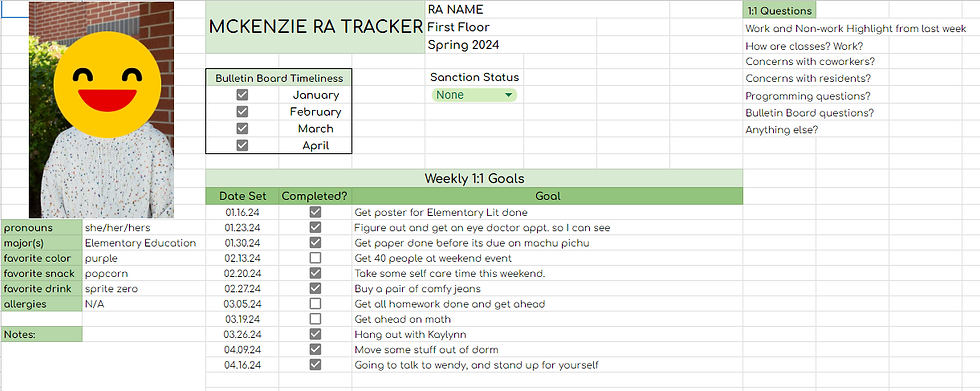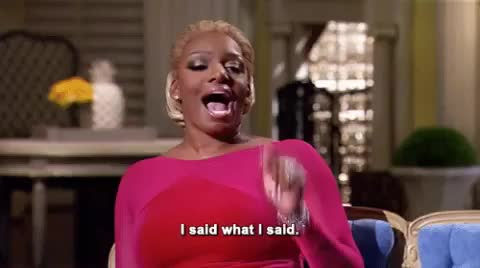The Tracker
- Kyra DeLoach
- Jul 8, 2024
- 3 min read
Updated: Jul 21, 2024
Kyra DeLoach
Spreadsheet GIF
“Collecting information doesn’t require tests, and sharing that information doesn’t require grades.” (Kohn 2011) This subject that Alfie Kohn researched really encompasses one of my most successful creative assessments I have used to this day: The RA Tracker.
As a Residence Hall Manager, grading is something I have not had to really think about. After I started my MAET courses, I realized two things: 1. I loved ungrading, as it made me feel like I started with a clean slate and a good start 2. I loved the Feedback Notebook to see my progress throughout the semester.
I supervise 6 Resident Assistants and we teach them a lot of policies, procedures, and strategies for assisting residents. Throughout these training sessions, we don’t do a ton of assessment. I was looking for a way that I could keep track of my RAs progress and goals and also give them access to it, so they can track their progress as well and see what they need to work on, etc.
In Fall 2023, I attended the Great Lakes Association of College and University Housing Officers (GLACUHO) conference. There, I attended a session by Community Director Caroline Murray from Michigan State University. Her session was on different tools she uses for her RAs and that is where I found out about the RA Tracker.
The tracker Caroline created focused on 1:1 meetings and has categories for evaluation goals, accountability, stressors, self-care plan, and information on the student. I was amazed by how organized this tracker was, and I knew I wanted to bring it back to my institution.
After I had the copy, I decided to change the template to fit my RAs needs and my 1:1 meeting needs– this included goals, a bulletin board tracker, and a sanction status and just fun information about my student. The first 1:1 meeting served as ‘intake’ where we filled out the information together and it set a great base for my RAs. I gave them access to the sheet and they could review it and leave comments. In Understanding by Design it says, "We are also designers of assessments to diagnose student needs to guide our teaching and to enable us, our students, and others (parents and administrators) to determine whether we have achieved our goals." (Wiggins & McTighe, 2005, pp. 13) I feel this is a perfect example of the purpose of the RA Tracker; When I changed it for my students' needs specifically, I was designing it to guide them.


Examples of RA Tracker Questions and Categories
This Google Sheet replaced 3 different pieces of paper I used to use to assess my students / track information. I used it for the Spring 2024 semester and it was a creative and successful way to assess my students. My students have found it helpful to be able to have access to their entire semester of progress: the good, the bad, and the ugly. A statement in Kohn’s writing talks about Achievement: “An overemphasis on assessment can actually undermine the pursuit of excellence (Maher and Midgley, 1996 p. 7)” (Kohn 2011). I am clear with my intentions of tracker. I let them know what it is for and am transparent. RAs don’t feel like they have to tell me what I want to hear so they have a good report– they tell me what’s really going on so they can have a genuine look into their semester at the end of it. I emphasize that the track helps both of us.
It can be difficult to think about assessment or grades as someone who is not a teacher. However, I am looking forward to finding more ways that I can assess my staff and ways they can assess themselves so we can all work towards our goals as a team. Creative assessment should benefit everyone, and I think it is so important for what I do.
References
Kohn, A. (2011). The case against grades. Alfie Kohn.
Wiggins, G., & McTighe, J. (2005). Understanding by design, (2nd Ed.). Association for Supervision and Curriculum Development.







Comments